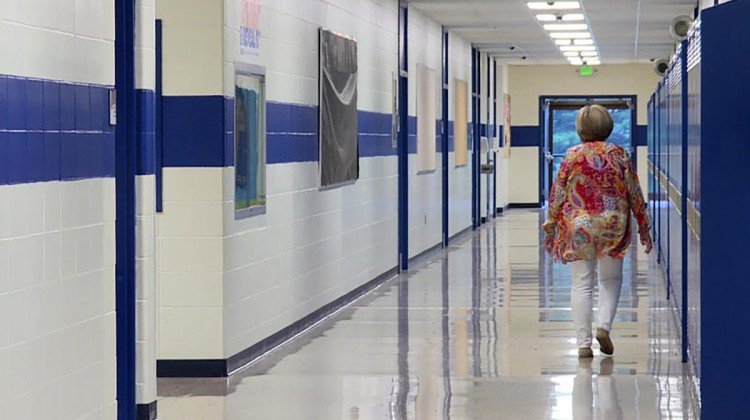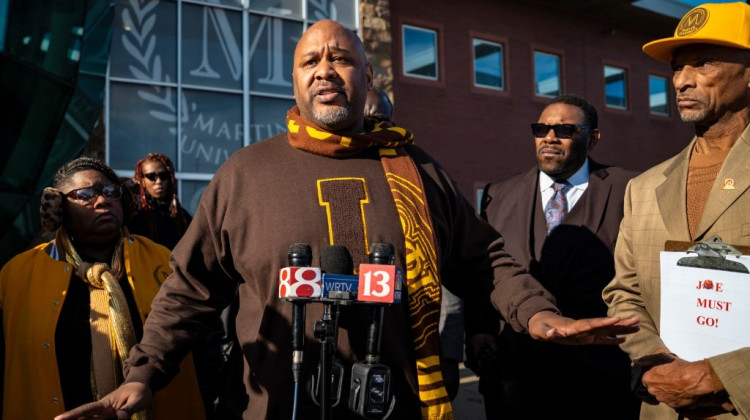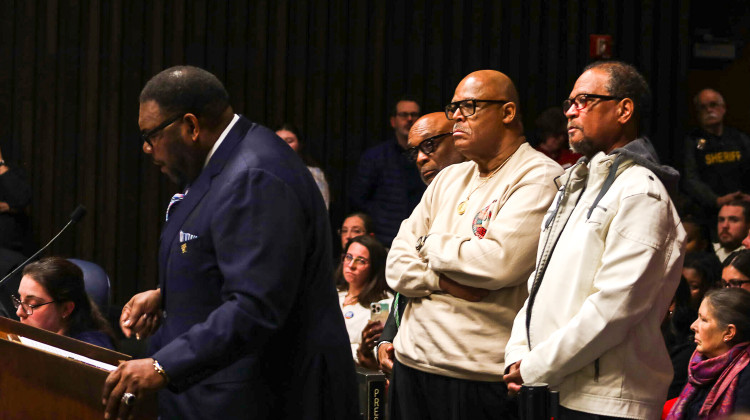
In Marion County, the teacher retention rate dropped from 70 percent in 2021 to 66 percent in 2022, and increased slightly to 68.5 percent in 2023
File photo / WTIUTeacher retention rates continue to flux across Indianapolis and the state. It’s an ongoing trend that impacts stability in the classroom and can negatively impact school culture. A new survey from a local nonprofit found Marion County educators want better pay, respect and autonomy to keep them in the teaching profession.
Local nonprofit RISE Indy surveyed Marion County teachers to learn about potential policy recommendations to improve teacher morale and recruitment. RISE describes itself as drawing attention to issues around student achievement and equity in local schools. A political action committee associated with the organization has raised significant donations for candidates in local school board races and political races.
The survey found educators’ three primary concerns are: pay, perception and policy. And many of the concerns were especially acute among younger teachers. Jasmin Shaheed-Young, CEO and founder of RISE Indy, told WFYI that needs to be fixed in order to improve teacher retention in the next several years.
“Especially with an increase in that heightened dissatisfaction with younger teachers, it makes it clear that we've got to figure out how to make sure that they stay,” said Shaheed-Young. “Because with the teacher vacancy continuing to increase and the backfill not being available, we'll see that in the next you know, five to 10 years, we’ll experience that vacancy, and we'll have to figure out a new solution.”
In Marion County, the teacher retention rate dropped from 70 percent in 2021 to 66 percent in 2022, and increased slightly to 68.5 percent in 2023, according to data from the Indiana Department of Education compiled by the Fairbanks Foundation. Last year the statewide retention rate was 80 percent.
The survey was based on responses from 575 Marion County teachers from various public school types including: traditional district, charter schools and Innovation schools. The organization partnered with local groups MelanatED Leaders and Teach Indy to conduct the survey.
Some survey results were reported based on the type of school a teacher works at: traditional district, charter, or Innovation Network. An innovation school operates operational autonomously in a district partnership, but some statutes applicable to school corporations do not apply to them. Most IPS Innovation schools are run by charter operators and a few that are run by a nonprofit.
Here are some of the findings from the “Advancing Satisfaction in Marion County Schools” survey.
Compensation
Teachers at district managed schools have more negative perceptions of pay than those at innovation or public charter schools. Sixty-one percent of district teachers disagree that they are paid a fair wage, compared to 47 percent of public charter school teachers and 33 percent of teachers at innovation schools.
Charter and innovation schools do not have to follow a collective bargaining agreement with a union.
The majority of teachers surveyed — 57 percent — believe they are underpaid. But younger teachers, ages 34 and under, have a more negative perception of pay: 64 percent believe they are underpaid.
Teachers’ starting salaries for a majority of Marion County’s 11 school districts was at least $50,000 last school year, according to contracts.
“I think we have a lot of veteran educators that have been in the building and have been able to withstand covid and the changes in education policy,” said Shaheed-Young. “So those veteran educators are able to stay, and don't feel the same sort of changes as impeding their ability to actually educate.”
Perception
Seventy-three percent of respondents said they feel society doesn’t respect their profession. The feeling increases to 79 percent among teachers ages 34 and under. Results were similar at the three types of schools educators work at.
Shaheed-Young says that’s a problem.
“All kids need to have teachers that feel like they're valued,” said Shaheed-Young. “They have to have teachers that feel like they're paid a livable wage, as well as have benefits and mentorship.”
RISE recommends that policymakers prioritizes take-home pay, rather than increases in the form of health benefits and pension so that teachers can feel an immediate benefit.
The General Assembly will create the state’s next two-year budget during the legislative session that starts in January.
Policy and support
The survey found 56 percent of teachers say recent policy decisions do not make them feel more secure in their jobs. Only 13 percent of teachers feel that policies make them feel more secure in their teaching careers, while 31 percent neither agree or disagree.
Some teachers said they would like to see more support and engagement from parents.
“When we're thinking about what we can do from a policy and programmatic piece to improve education, we must have teachers at the table,” said Shaheed-Young. “We must have students at the table, and we must have parents as well at the table to talk to elected officials and policymakers.”
They survey also found 65 percent of respondents are “satisfied with their schools as a
workplace.” There are few satisfied younger teachers — 56 percent.
“We must work to ensure that younger teachers are engaged and have the right mentorship and support…,” the report said.
Who was surveyed?
The majority of the teachers in the survey work at a traditional public school district, have 10 or more years experience and are White. More demographic details are available in the survey report.
Contact WFYI education reporter Sydney Dauphinais at sdauphinais@wfyi.org.
 DONATE
DONATE







 Support WFYI. We can't do it without you.
Support WFYI. We can't do it without you.